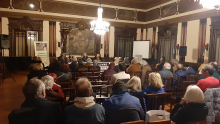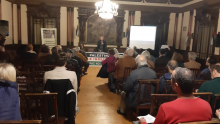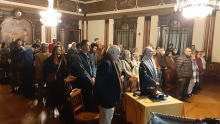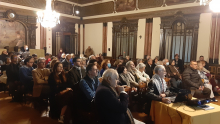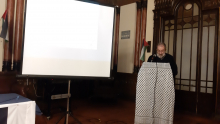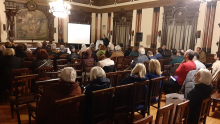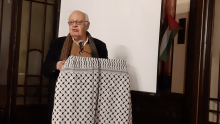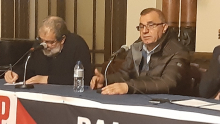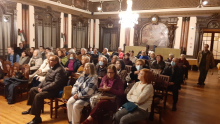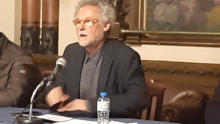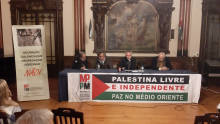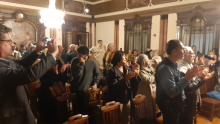Saramago and the Israeli occupation in focus in the session of the International Day of Solidarity with the Palestinian People
MPPM marked the International Day of Solidarity with the Palestinian People, this Tuesday, November 29th, with a public session at Casa do Alentejo, in Lisbon, which was attended by around one hundred people.
Before starting the session, Carlos Almeida, vice president of the MPPM, who moderated due to health problems of the president Maria do Céu Guerra, proposed a minute of silence in memory of the five Palestinians who were killed this day by Israeli occupation forces.
Then, a simple homage to José Saramago [Nobel Prize for Literature 1998], a militant of the Palestinian people's cause and founder of the MPPM, on the occasion of the hundredth anniversary of his birth, began.
Unable to attend, Pilar Del Rio, Saramago's widow, sent a message from the Guadalajara Book Fair in Mexico, where she is staying, symbolically engraved on the United Nations stand.
"To unite the contexts, the names of Palestine and José Saramago, is an evidence, because José Saramago was always with Palestine."
"Palestine exists. It existed 75 years ago, when the UN declared it, and it exists now. There, since then, men and women do not lose a single day to claim their right to exist, to be free, to be equal, to be independent." To these men and women "I show my respect, my admiration, and my testimony of gratitude."
Jorge Cadima, from the MPPM National Board, then evoked the connection of José Saramago to Palestine and the MPPM, while images of Saramago's visit to Palestine and his participation in MPPM initiatives were projected. Jorge Cadima, opening, said:
"José Saramago was a man totally committed to his time, in particular to the struggle of human beings and peoples for emancipation from all forms of exploitation and oppression. The drama of the Palestinian people, their national cause, their heroic struggle against occupation and for freedom, found in José Saramago a committed, courageous and heartfelt voice of solidarity.
Saramago always wanted to add his lucid and firm voice to that of other Portuguese in initiatives that paved the way for the creation of the MPPM and, above all, in defence of the life and future of the Palestinian people."
The visit he made to Palestine in 2002, as part of a delegation from the International Parliament of Writers, which met with Yasser Arafat and Mahmoud Darwich, and the statements he made, impressed with what he had seen, deserved special mention.
At the end of this tribute to José Saramago, there followed speeches alluding to the date that was being marked.
Carlos Matos Gomes, a retired army colonel, writer, and a participant in the Carnation Revolution [April 25th, 1974], said namely:
"There is no international law. Between states, what exists is the right of force. International law boils down to justifying domination by force."
"The use of force and violence is the law in Palestine today. The repetition of colonialism, intolerance, slavery, racism, nazism, should shame us as human beings. In the 5000 years of humanity we have learned nothing."
"What is happening in Palestine is a war of extermination. The State of Israel is a totalitarian state that aims only at the extermination of the Palestinians. It remains for the Palestinians to resist. And the progressive forces must support the resistance of the Palestinians."
This was followed by the intervention of Dr. Nabil Abuznaid, Ambassador of Palestine in Portugal, who began by thanking, on behalf of the Palestinian people, on behalf of the mothers and fathers of the victims of Israel, "your being with Palestine [...] and your commitment to carry this struggle to victory."
"Israel was created by the imperialism of the United States and Western Europe. Israel was created to save imperialism in the Middle East. [...] Imperialism wanted to use Palestine to solve the problem of the Jews."
"Europe thinks that the US is the key to the solution, so they follow everything they say. [...] Europe's support for the Palestinian Authority is actually a support for the occupation, because the money goes for food, for health, for education, which are obligations of the occupying power."
"Portugal does not recognize the State of Palestine because it does not want to recognize the occupied territories as being the State of Palestine, and that only favours the occupation."
"The people of Israel have elected a fascist government that will take insane positions against the Palestinian people. We are going to see more killing in Palestine."
"We must convince the Portuguese government to take measures that will stop the killings. Declarations alone are not enough."
Carlos Almeida, historian and vice president of the MPPM, closed the session recalling that the celebration of November 29 as International Day of Solidarity with the Palestinian People was established on December 2, 1977, by the UN General Assembly, to remind that in the 30 years since the approval, on November 29, 1947, of Resolution 181, called of the partition, nothing had been done to resolve the situation of the Palestinian people. Similarly, Resolution 194 of 1949, which established the right of return for Palestinian refugees who wish to return, has yet to be fulfilled.
"There is a great contrast between international law and UN resolutions, and what is happening on the ground. [...] If the world has risen in unison with sanctions and blockades on Russia for what is going on in Ukraine, why is it not doing the same to Israel for what is going on in Palestine?"
"Next year marks the 30th anniversary of the Oslo Accords. Israel was supposed to withdraw from the occupied territories within 5 years. It has not withdrawn and the number of settlers has increased fivefold."
"What exists today in Israel is the result of decades of apartheid, of racism, of colonialism, of supremacism."
"It is 75 years of occupation, but it is also 75 years of resistance: of resistance against occupation, but also of resistance against silence, hypocrisy and forgetfulness."
"This is the moment to affirm our solidarity, a solidarity that recognizes the right of the Palestinian people to decide their fate and their way of resistance. Let's tell the fathers and mothers of Israel's victims, the Palestinians of the West Bank and Gaza Strip, those in Israel's prisons, that there is a people here who make their struggles our own."

